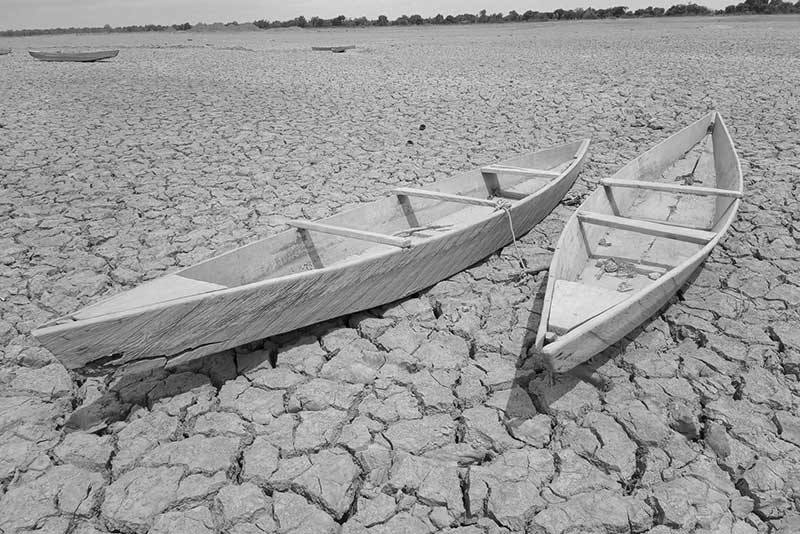What exactly are environmental refugees? And what can you do to prevent environmental escapes? If you're looking for answers to these questions, you've come to the right place! Many people flee because of wars, Famines or poverty from their home countries. Many people in Western nations like Germany believe there is little they can do about it. A donation to a human rights organization, perhaps? And then the possibilities already seem limited. But often ecological problems such as water scarcity, the Deforestation of rainforests or climate change are the fundamental triggers of the reasons for flight mentioned above - problems that we ourselves are responsible for with our way of life. More and more often, they are even the decisive factor for the flight from one's own homeland.
In this article I would like to give you everything you need to know about environmental and climate refugees. From the definition, to facts and figures, causes and examples of consequences, to solutions. My main goal is to give you a better understanding of the situation of environmental refugees. Let's go!
Here is in advance a short Overview about the article:
What exactly is an environmental refugee?
At Environmental Refugees (often also Climate refugees called) one understands People leaving their habitat due to environmental changes or natural disasters, to escape to a safer environment.
Those fleeing environmental change are, according to the refugee definition of the Geneva Refugee Convention but not a refugee in the classical sense. Here it is called:
Article 1, paragraph 2, Protocol Relating to the Status of Refugees: Refugee status shall be granted to persons [...] who, as a result of events which occurred before January 1, 1951, and owing to a well-founded fear of persecution on account of their Race, religion, nationality, membership in a particular social group or because of their political conviction is outside the country of which he or she is a national and is unable or, because of such fears, unwilling to avail himself or herself of the protection of that country [...].
Facts & figures on environmental refugees
Unfortunately, there are only few statistics around the topic of environmental flight. This is mainly due to the lack of uniform definitions and the fact that in many cases the main cause of flight (poverty, wars, etc.) was caused in the first instance by ecological or climatic changes. Nevertheless, here are some facts that are known about environmental refugees:
- Afghanistan is the country with the highest number of internally displaced persons due to natural disasters - about 1.2 million in 2019.₁
- In the period 2008-2017, the IDMC (Internal Displacement Monitoring Centre) recorded the displacement of A total of 246.5 million people by geophysical and climate-related disasters.₂
- For 1995, environmental scientist Norman Myers spoke of about 25 million environmental refugees. By the year 2050, he expects about 150 million environmental refugees.₃
- According to the International Red Cross Environmental refugees now account for about 58 percent of global refugees off.₄
What are the causes of environmental flight?

Now we already know a little more about environmental refugees - but what exactly forces people to flee their homes? Here are some of the typical environmental causes:
- Soil erosion
- climate change (e.g., loss of national territory due to flooding).
- Water shortage
- Natural disasters
- Desertification (desertification)
- Pollution due to pesticide use or waste
- Social destabilization as a result of environmental degradation
One could make it easy and claim that environmental refugees are fleeing from nature. But on closer inspection, nature itself is nothing to be afraid of - rather, it is the ecological consequences of our destructive, Western way of life that are driving people to safer countries.
What would you do if you and your family were threatened by natural disasters or climate-related crop failures destroyed your livelihood? We are already doing pretty well. So well, in fact, that the lifestyle of our Western world is one of the main causes of climate change, which may currently be hitting other countries even harder than ourselves. But we also know that global warming does not stop at national borders.
Examples of environmental refugees

A few examples can be used to illustrate the consequences of our climate-damaging way of life more tangible for other people. I could list thousands of examples here - but I think that the following can create a deeper understanding of the problem:
- Syria war: The civil war in Syria is the result of a period of drought that led to crop failures and forced people from the countryside into the cities. With the ensuing unemployment, discontent increased. Waves of protest increased - the civil war began. Since 2011, around 5.7 million people have fled the Syrian war.₆
- Chernobyl: The reactor accident in Chernobyl, Ukraine, on April 26, 1986, forced the inhabitants to flee. About 130,000 people had to leave their homes due to the environmental or nuclear disaster.
- Carteret Atoll: The small islands of Han, Huene, Jangain, Yesila, Iolassa and Piul, which belong to Papua New Guinea, have no electricity, no cars and certainly no factories. The way of life of the people there contributes only marginally to global warming, yet the islands are soon doomed. Around 2,000 people will then inevitably be among the first climate refugees.₇
- Nile River Delta: It is not only sea-level rise and flooding, but also the resulting soil salinization that is having a significant impact on agriculture in the Nile region. About 35 percent of the grain for all of Africa is produced here, but crop yields are falling. Famine - and thus a major reason for flight - is pre-programmed.₈
What can we do about environmental flight and for environmental refugees?

Now we know some facts, causes and examples for and about the situation of environmental refugees. But the question is still open what we can really do in the long term, besides relief measures on the ground, to prevent people from having to leave their homes because of an uninhabitable or unusable environment.
live more consciously and sustainably
As already mentioned, our way of life is the main driver of environmental problems, which in turn are a frequent cause of flight. However, by adopting a more sustainable, respectful way of life, we can specifically counteract climate change and other ecological challenges of our time. Above all, it is also about respect for other people - at whose expense we live. Here are some examples and further information on sensible approaches to solutions for each individual:
- Do without meat (see also Why vegan? and Vegan for human rights)
- Consume organically, seasonally and regionally (see also seasonal shopping and buy regionally)
- Live more climate friendly (see Tips for climate protection in everyday life)
- Live more sustainably (see Tips for a more sustainable lifestyle)
Making politics responsible
Climate and environmental flight have clear causes that can be traced back to us humans in the Western world. Politics has the task to force the public, but partly also the private, (together) life of the citizens, actions and aspirations to lead the community.₅ The Climate and environmental protection measures by the government must therefore be intensified - and this is apparently only possible through pressure from the population.
You can do demonstrations and Launch online petitions or support existing actions to intensify policies against environmental flight. This could be, for example, increasing the VAT on animal-based foods from 7 to 19 percent and reducing the VAT on plant-based foods such as soy milk from 19 to 7 percent.
Do you have other ideas in the fight against environmental flight? Then feel free to write me a comment!
Environmental flight - A problem that must not be ignored!
We Germans in particular like to grumble about the many refugees making their way to Germany. It definitely helps to be aware of why these people are fleeing their homeland. Wars, famine and climate change. These are consequences that do not affect us in Germany, or so far only to a limited extent.
It is important to understand, that with our western, luxurious and resource-intensive way of life, we live at the expense of others.. Not only at the expense of people in poorer countries, who are already feeling the consequences of climate change in the most brutal way. But also at the cost of the planet that we share with other living beings. So we are one reason why there are environmental refugees. But we can also become a problem solver.
Do you have questions, suggestions or your own experiences with the topic of environmental escape? Then feel free to write me a comment under this post.
Stay sustainable,

PS.: You want to know how to live more environmentally friendly so that less people have to flee from environmental problems? Then take a look at my Book "Sustainable living for beginnersThe program will answer all your important questions and provide you with a convenient introduction to the future-oriented way of life.
References:
₁ IDMC; Statista GmbH: Top ten countries with the highest number of internally displaced people due to natural disasters (as of December 2019), https://t1p.de/jot7. [16.04.2021].
₂ IDMC: 2018a - Global Report on Internal Displacement 2018, https://www.internal-displacement.org/global-report/grid2018. [16.04.2021].
₃ J. Tangermann: On forecasting the magnitude of climate-induced migrations (as of 01.023.2019), https://t1p.de/lw87. [16.04.2021].
₄ International Federation of Red Cross and Red Crescent Societies: World disaster report 1999. [16.04.2021].
₅ Manfred G. Schmidt: Wörterbuch zur Politik (Kröners Taschenausgabe. Band 404). 2nd, completely revised and expanded edition. Kröner, Stuttgart 2004, ISBN 3-520-40402-8, p. 538 f.
₆ L. Neal: Heated Conflict (Mar. 22, 2019), https://t1p.de/2zc0. [16.04.2021].
₇ Mission EineWelt: Climate Escape in the Pacific, available at https://t1p.de/h9oj. [16.04.2021].
₈ Environmental refugees: fact or fable? (Accessed May 30, 2016), https://t1p.de/a4cv. [16.04.2021].





